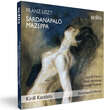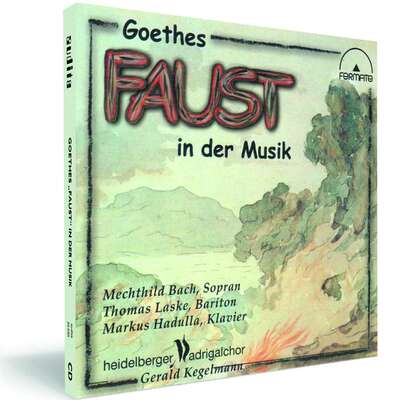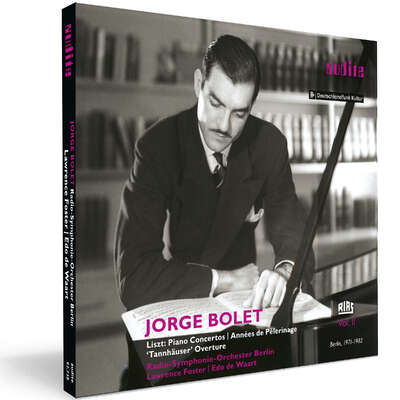
Auto-Rip
Doppelte Premiere - Ersteinspielung und Uraufführung: Franz Liszt hat seine späte Oper Sardanapalo nie fertiggestellt. 170 Jahre alt, ist der rekonstruierte erste Akt wie ein Prisma, in dem sich die Welt der Oper um die Mitte des 19. Jahrhunderts in Liszts unverwechselbarer Musiksprache bricht. Kirill Karabits dirigiert Liszts Orchester in Weimar, wo die Musik komponiert wurde. Ein Programm voller Lord Byron-Romantik.mehr
„ein Tondokument, auf das die Welt wirklich gewartet hat“ (Thüringer Allgemeine)
Titelliste
Diesen Bonustrack erhalten Sie ausschließlich als Download!
Details
| Franz Liszt: Sardanapalo - Mazeppa | |
| Artikelnummer: | 97.764 |
|---|---|
| EAN-Code: | 4022143977649 |
| Preisgruppe: | BCA |
| Veröffentlichungsdatum: | 8. Februar 2019 |
| Spielzeit: | 73 min. |
Zusatzmaterial
-
An Uncrossable Rubicon: Liszt’s Sardanapalo revisited
Weiterführende Literatur von David Trippett. David Trippett ist University Senior Lecturer für Musik an der University of Cambridge. Zu seinen zahlreichen Veröffentlichungen zählen Wagner’s Melodies (Cambridge: University Press 2013), und er wurde mit mehreren internationalen Preisen ausgezeichnet. Das erhaltene Manuskript zu Sardanapalos erstem Akt wurde von ihm dechiffriert, editiert und orchestriert.
- Digibooklet
- Libretto (Italienisch / Englisch / Deutsch)
- O-Ton_20191217
- Interview David Trippett_Presto Classical_20190208
- WDR 3 TonArt_20190214
- Feature: BBC Music Magazine_032019
Informationen
Konträre Helden: Mazeppa und Sardanapalo mit Karabits und der Staatskapelle Weimar
Sardanapalo, der Wein und Konkubinen Politik und Kriegsgeschäften vorzieht, und Mazeppa, der nach Leid und Erniedrigung ruhmvoll stirbt - literarisch-dramatische Vorlagen, von Liszt eindrucksvoll vertont. Die zeitgleich entstandenen Werke repräsentieren Liszts Ideen im Ringen um eine Vereinigung von Literatur und Musik. Auf der einen Seite die Modernisierung der italienischen Oper, auf der anderen die Weiterentwicklung der Symphonik zur Sinfonischen Dichtung.
Das Manuskript zu Sardanapalo umfasst den ersten Akt. Das Material lag 170 Jahre lang stumm im Weimarer Goethe- und Schiller-Archiv. Erst 2017 wurde das Manuskript von David Trippett an der University of Cambridge entschlüsselt, editiert und orchestriert.
Kirill Karabits dirigiert mit der Staatskapelle Weimar Listzs Orchester in der Stadt, in der die Oper komponiert wurde. audite setzt damit die Veröffentlichung von Werken der großen Weimarer Komponisten-Kapellmeister fort.
Besprechungen
Luister | 2 oktober 2021 | Quirijn Bongaerts | 2. Oktober 2021 | Quelle: https://www.luis...
Sardanapalo – wie o wie was Sardanapalo? Eugène Delacroix schilderde eenMehr lesen
Newsletter of the Hungarian Liszt Society | Nr. 40 – August 2020 | Mária Eckhardt | 1. August 2020 | Quelle: http://www.liszt... Ferenc Liszt: Sardanapalo – Resuscitation of an operatic fragment
It is well known that Ferenc Liszt’s oeuvre comprises only one complete opera: Don Sanche, composed in his adolescence, whose world première was inMehr lesen
Liszt's operatic plans, including Sardanapalo, have been examined by several scholars, and studies were already published decades ago. In 2017, however, it caused a sensation when an English music historian, David Trippett, announced that he had succeeded in reconstructing a complete, performable act of the opera with years of work (and with the help of his linguistic colleagues in terms of the libretto) from the autograph containing merely short references about the instrumentation, and noted only in sketch form and mostly in musical stenography. It was characteristic of Liszt's working method at that time that, in the first stage, he only prepared a piano (or vocal-piano) sketch of his orchestral or vocalorchestral works – or a so-called particella, a short score sketch – specifying at some points what kind of instruments he would like to see in the full orchestral score. After that he delegated the instrumentation to one of his composer secretaries, Joachim Raff or August Conradi. Liszt then thoroughly reviewed the score they had prepared and corrected or supplemented it at many points, and then had it copied out again, so that the final version, when completed, fully reflected his own concept. However, there was more than one composition where the work of instrumentation was not completed (just as in the case of Sardanapalo, which Raff was supposed to orchestrate, but it never happened), or it was albeit done, but got stuck at one point, sometimes at a very advanced stage (as for example, Four Elements – Les quatre élémens, where the last steps necessary for a possible performance were completed by Géza Gémesi in 2016).
On the occasion of the 2017 press announcement, details of the Sardanapalo reconstruction were posted on youtube as well, and on August 19th and 20th 2018, the full reconstructed opera act was presented and recorded in Weimar at the Neue Weimarhalle Congress Centre. Prior to the event, Tamás Pallós had published a very informative article on the topic in the column "Our Recovered Values" in the weekly cultural magazine Mértékadó. The main reason why we are turning to the appreciation of the Sardanapalo-reconstruction exactly now is the fact that the programme schedule of this year's Spring Festival included the Budapest première of the work in a performance by the Weimar ensemble, which, however, could not come true unfortunately due to the epidemic situation, and we do not know if this highly anticipated concert can be made up for in the future. Nevertheless, for those interested in the topic, we are happy to recommend the CD recording that has been released in the meantime, and in addition to the opera act of just over fifty minutes, the disc also features the symphonic poem Mazeppa. Furthermore, we are in the fortunate position of holding in our hands the original score material that survives in one of Liszt’s sketchbooks, registered in the Goethe-Schiller Archive in Weimar under the bookmark N 4, which was the basis of Trippett’s instrumentation. The New Liszt Complete Edition by Editio Musica, namely, under publication for many years now in the excellent edition by Adrienne Kaczmarczyk, released this score at the beginning of March this year – perfectly timed for the planned Hungarian première – thus launching Series IX of the "New edition of the complete works by Ferenc Liszt", which is to feature “Vocal Works with Orchestra or with Multiple Instruments". The release of a series of supplement volumes for the two series of two-handed piano works is close to completion, and it is very gratifying that the publisher has not missed the opportunity to launch another series in parallel by publishing this particularly interesting and timely musical material. David Trippett, who is currently the person most familiar with the material, was invited to the publication, while the libretto was reconstructed by Marco Beghelli, assisted by Francesca Vella and David Rosen. The introductory study (in English, German and Hungarian) provides detailed information about the history of the work’s origin, the problems with the libretto, and also raises the question of why Liszt abandoned composing the opera (although is not answered definitely). The critical commentaries (only in English already, as usual) also provide information on the theoretical aspects of the release, the nature of the musical source, and the reconstruction of the libretto. The critical notes themselves are very detailed (which is understandable and necessary for the publication of a material that survives only in sketch form). It is also very useful that after the score material, the complete libretto in rhymed form in Italian is also available, separately and in a complete form, along with prose translations in English, German and Hungarian. Facsimile reproductions of no less than six original score pages, provided with proper explanations, help us understand from what sources and how the publishers worked, what kind of typical abbreviations Liszt used, how he indicated instructions for the instrumentation etc.
The theme of Sardanapalus was very popular in Liszt's youth, especially after Byron, whom Liszt particularly revered, had published a poetic tragedy in five acts in 1821 with the title Sardanapalus, which he dedicated to Goethe. As early as 1827, Liszt obtained a complete French edition of Byron's works by Amédée Pichot, which later survived in the library of his son-in-law, Émile Ollivier. Liszt marked several volumes of the series with underlinings and handwritten entries in the margins, including the 11th volume that contains Sardanapalus. According to the story, the fall of the last Assyrian king was due to his favouring the pleasures of life and love, and his naive love of peace. Liszt had a lot of trouble obtaining a libretto based on the subject and suitable for composing music. Eventually, with the help of Cristina Belgiojoso, an Italian princess living in voluntary exile in Paris, he managed to obtain a libretto by a poet whose name is unknown to us, which he found already good enough to start composing. The characters of the completed first act are Sardanapalo, his dearest concubine, Mirra and the royal adviser, Beleso, as well as the women’s chorus, impersonating the other female prisoners of the ruler. Mirra's fate foreshadows the situation of Aida in a way: although she is a prisoner and is tormented by a longing for her lost homeland, she cannot hide from herself that she is impressed by Sardanapalo, and tender feelings have woken in her heart towards him. Liszt’s musical interpretation for this is a very beautiful solo section composed for the soprano singer, wherein he masterfully weaves together the lyrical, dramatic and virtuoso parts, interestingly blending the traditional elements of Italian opera with his own characteristic modulations and bold harmonies. On the CD, Joyce El-Khoury performs the grandiose melodies, passionate recitatives, and coloratura elements with amazing security and authenticity. Sardanapalo, who would do anything to drive away the grief of his beloved and win her love, is a true grateful heroic tenor role, which Airam Hernández demonstrates accordingly. Their duet scene is particularly beautiful, wherein they get to the point, through Italian-like ariosos and passionate recitatives, when the girl confesses her love, too, and they unite in an ecstatic duet, at the end of which they sing the Italian melody unisono. All this does not happen in a conventional manner at all, and it is particularly interesting when Beleso, the ruler’s adviser, played by Oleksandr Pushniak, a bass singer with a beautiful voice, unexpectedly appears at the pinnacle, calling upon the ruler why he does not focus rather on maintaining his power and his empire, which is threatened by enemies through betrayal. The peace-loving ruler answers: “I am not deceived by the easy boast of a fleeting glory. Every glory is a lie, if it must be bought with the weeping of afflicted humankind.” Eventually Mirra joins the dialogue between the two men, and also encourages the king to fight: “If I am dear to you, show the world your valour!” This convinces Sardanapalo: the act ends with a great terzetto and the preparation of the royal army for war, with belligerent orchestral music and a march.
It was a fortunate idea to begin the Weimar CD recording with the Mazeppa symphonic poem, because if we listen to the Sardanapalo act right after it, it is easy to recognize what instrumentation pattern David Trippett followed during the reconstruction of the score. It is also clear that not only did Liszt know very well the language and instruments of contemporary Italian opera (Bellini, Donizetti, the young Verdi), but so does Trippett. An interesting, special blend is the result of intertwining the typical Italian opera style and Liszt’s specific musical language, and we can only regret that we do not know of any musical composition material for the other two acts of the three-act libretto, for which Liszt recommended various amendments. "We do not know whether Liszt had already worked up some musical material for these missing acts in anticipation of receiving a revised libretto for Acts 2-3. None of this is notated in N4, in any case. The opera is not mentioned in his correspondence thereafter, and just as Liszt moved decisively onto new compositional challenges, he neither recycled nor destroyed the music for Sardanapalo” – Trippett writes. This is fortunate – because in this way we can be certain that Liszt could also have been a successful opera composer among the musicians of his age. We owe many thanks to David Trippett for the instrumentation, and the Weimar performers, led by the Ukrainian conductor Kirill Karabits, who shows an obvious commitment to Liszt. We can be grateful that they have introduced this precious piece of music to the world at such a high standard, with genuine empathy, and in an understanding interpretation of its particular style. We can only wish that the missing Hungarian première may take place sometime!
www.amazon.co.uk | 24 January 2020 | Rural Ninja | 24. Januar 2020 | Quelle: https://www.amaz... This is fantastic!
First to get it out of the way, the Mazeppa performance is fine, but nothing special.<br /> <br /> Now onto the single reconstructed act of the opera: This isMehr lesen
Now onto the single reconstructed act of the opera: This is fantastic stuff. Not just for Liszt completists. The music is thrilling, and the central love duet and finale particularly so. Melodic in a way that Liszt sometimes isn't, dramatic as the best of his work. Totally brilliant. Perhaps this isn't the best of librettos and the best of drama in the libretto, but the music, my goodness, the music! What a shame this is just one Act. It's a complete transfiguration of the Italian operatic style of the 1850s. To me, this has surprisingly little in common with the far more dignified dramatism of his oratorio on St Elizabeth, which was also semi-staged an opera by Liszt from time to time. I wasn't really expecting music as thrilling and barnstorming as this opera fragment.
Now onto the single reconstructed act of the opera: This is
Avant Scène Opéra | 21/12/2019 | Jean-Charles Hoffelé | 21. Dezember 2019 | Quelle: https://www.asop...
Joyce El-Khoury, de son timbre plein de caractère, de sa grande voix de pur théâtre italien, en magnifie les inventions stupéfiantes, surmontant les épreuves inhumaines que l’écriture lui impose. Pour ce moment, qui prouve que si Liszt l’avait un peu plus voulu il aurait eu ici autant à dire qu’à son piano et à son orchestre, la découverte vaut la peine, d’autant que Kirill Karabits croit à l’ouvrage, l’enflamme, comme les deux voix masculines qui ont pourtant si peu d’espace pour affirmer leurs personnages.Mehr lesen
https://o-ton.online | 17.12.2019 | Karin Coper | 17. Dezember 2019 | Quelle: https://o-ton.on... Grandioser Operntorso
2018 wurde ein Operntorso uraufgeführt. Komponist dieses Fragments istMehr lesen
Note 1 - Neuheitenheft | Weihnachtsbroschüre | 1. November 2019
Franz Liszts Oper Sardanapalo blieb leider ein Fragment und umfasst lediglich den ersten Akt. Erst 2017 wurde die Niederschrift von David Trippett anMehr lesen
Diapason | N° 683 - Octobre 2019 | Paul de Louit | 1. Oktober 2019
En août 2018 à Weimar, la découverte de ce Sardanapale faisait événement. Pensez donc ! La seule incursion de Liszt dans le genre lyrique,Mehr lesen
Le livret est peut-être imputable à la princesse Belgiojoso, son flirt du moment. De ce premier acte pour trois personnages et choeur se détache une grande Scena dramatique et émouvante, proche du « E strano » de Traviata. Elle met à rude épreuve l'aigu de Joyce EI-Khoury, dont le timbre chaleureux et expressif sert noblement le rôle de la ninivite esclave Mirra. On n'aura que des éloges pour Airam Hernandez et Oleksandr Pushniak, qui font tout ce qu'ils peuvent pour donner vie aux rôles assez falots du pacifique roi d'Assyrie et de son confident va-t-en-guerre. La confrontation triangulaire piétine.
Notre grand Franz est meilleur dramaturge à son piano. Et peu familier de la prosodie italienne, bizarrement accommodée dans un essai de récitatif continu. Reste la découverte passionnante d'un Liszt inconnu, qui se détache de Meyerbeer, fraie avec Verdi et, tout en préservant un langage harmonique immanquablement à lui, a su puiser dans Tannhäuser et Lohengrin la prévalence d'un orchestre qui n'accompagne plus mais embrasse et guide les voix.
Restituée, complétée et instrumentée avec talent par le musicologue David Trippett, cette si importante partie d'orchestre est servie par une Staatskapelle de Weimar aux cordes précises, aux bois et aux cuivres incisifs quoique peu puissants. La baguette experte de Kirill Karabits pourrait se montrer elle-même plus dynamique, et surtout dans l'interprétation de Mazeppa qui ouvre le disque. Pour un peu, avec des fff si sages et des phrasés si courts, certains passages où strident piccolos et trompettes tiendraient davantage d'un kiosque de ville d'eau que des tumultes hugoliens.
www.amazon.co.uk | 16 August 2019 | Michelangelo Pierini | 16. August 2019 | Quelle: https://www.amaz... Scoperta interessantissima!
Ascoltare le sezioni ritrovate e ricostruite di un'opera lirica di Liszt è un'esperienza unica e da raccomandare a tutti i lisztiani! CD da avereMehr lesen
www.operanews.com | JULY 2019 — VOL. 83, NO. 12 | David J. Baker | 1. Juli 2019
Franz Liszt harbored operatic ambitions that remained unfulfilled. HowMehr lesen
Das Orchester | 06/2019 | Gerhard Anders | 1. Juni 2019 | Quelle: https://dasorche...
Weimarer Opernchor und Staatskapelle unter der Leitung des ukrainischen Dirigenten Kirill Karabits setzen sich ebenfalls exzellent in Szene. [...] Eine hochspannende CD!Mehr lesen
Classica – le meilleur de la musique classique & de la hi-fi | N° 213 - Juin 2019 | Jérémie Bigorie | 1. Juni 2019
Liszt, croyait-on, est resté définitivement sourd aux sirènes deMehr lesen
forumopera.com - Le magazine du monde lyrique | 28 Mai 2019 | Laurent Bury | 28. Mai 2019 | Quelle: https://www.foru... Franz aurait voulu s'appeler Giuseppe ou Richard
Portée par la Staatskapelle Weimar que dirige Kirill Karabits, la musique de Liszt convainc et l’on y entend de fort belles choses. Les dames du chœur d’opéra du Théâtre de Weimar ont assez peu à chanter mais le font avec beaucoup d’élégance.Mehr lesen
www.amazon.com | May 7, 2019 | 7. Mai 2019 | Quelle: https://www.amaz... Genuine discovery – a beautiful lost opera
This is a remarkable discovery that shows Liszt's natural voice in opera. What an eye-opening recording! The music is thrilling – an opera composedMehr lesen
Listening to this disc, I was emphatically persuaded that Liszt was capable of composing opera, and of shaping psychological drama on the stage. It comes from one of his most productive periods (1849-52), i.e. right in the middle of his career, at the same time as the two piano concertos, the first four symphonic poems, the B-minor sonata, revisions to the Dante Sonata and Totentanz, sacred choruses, Lieder, psalm settings etc.
There are four scenes, lasting 52 minutes. After the ethereal prelude (redolent of the Prelude to Lohengrin, with its characteristic woodwind and high strings) we move straight to the opening chorus of concubines. It's tantalizingly situated between Bellini and Verdi, but with more exploratory, chromatic harmony.
Scene 2 is for soprano alone. And what a feat of stamina, drama and coloratura it is. Mirra is angry at her situation: torn in two directions, between her love for the king, and his destruction of her homeland. Soaring lines, v moving in the lead up to the cabaletta. The final cadenza is sumptuous.
Scene 3 features a love duet between tenor and soprano, as they work out their feelings towards one another. Tension rises throughout (often through well-paced harmonic steps) with occasional moments of lyrical release, particularly the central march in 'sotto il tuo sguardo'. It's gripping stuff, and the closing climax is surely one of the finest in any opera from this period.
Scene 4 sees the entrance of the bass-baritone Beleso, who keeps urging the King to take his royal duties seriously, and go to war. It’s richly dramatic, almost Wagnerian stuff. There is also a stunning soprano aria here (‘Oh perché, perché’) from Mirra, and the final trio transforms this music into a high-paced, rousing finale. (What could possibly have followed this in Acts 2-3??)
For the performance there can only be praise – clear, at times beautiful and thoroughly committed. The orchestration is rich and thoroughly idiomatic, and the Weimar orchestra makes a terrific case for this rediscovery. All in all, it is a remarkable first recording that adds fascinating new colors to Liszt's identity. Surely it can’t be long before others join it.
orpheus | 03/2019 Mai/Juni | Christoph Zimmermann | 1. Mai 2019
Empfehlungen – Gehört, gesehen, gelesen
»Sardanapolo« – Franz Liszt, der verhinderte Opernkomponist
Es gibt Komponisten, welche sich mit dem Genre Oper ausgesprochen schwer taten, auch wenn sie – wie Schubert – vollendete Werke hinterließen. WieMehr lesen
Von »Sardanapolo« aus Liszts Spätjahren wurde zwar nahezu der gesamte erste Akt fertiggestellt, doch nur mit Andeutungen bezüglich orchestraler Ausführung. Warum das Interesse des Komponisten an dem Projekt abbrach, ist nicht letztgültig zu verifizieren. Ein Grund könnten die Schwierigkeiten hinsichtlich der Librettogestaltung sein. Dabei war die Orchestrierung durch Liszts Assistenten Joachim Raff bereits in Aussicht genommen worden. Aber auch dieser Kontakt verlor sich in einem allgemeinen Unbefriedigtsein über künstlerische Ansprüche. Was an Aufführungsmaterial überlebte (ausschließlich erster Akt, welchem allerdings 20 Finaltakte fehlen), wurde von dem an der Cambridge University lehrenden David Trippett in eine aufführungspraktische Form gebracht. Auch wenn zu vermuten steht, dass dem ergänzten »Sardanapolo«-Fragment keine große Zukunft im Konzertsaal beschieden sein wird, ist die Musik ungeachtet diverser Stilanleihen eine ausgesprochen attraktive Partitur, welche die lyrischen wie dramatischen Ansprüche des Stoffes mit großer Inspiration umsetzt.
Die Staatskapelle der Liszt-Stadt Weimar wird samt Chor unter dem ukrainischen Dirigenten Kirill Karabits den theatralischen Aspekten der Musik voll gerecht. Für die Titelpartie, den hedonistischen König Sardanapolo, den man gerne als »männliche Königin« bezeichnete, bringt der spanische Tenor Airam Hemandez vielleicht nicht ein ideal charakterisierendes Timbre mit, dennoch nimmt die lyrisch ausgreifende Stimme ungemein für den Sänger ein. Wie der Dirigent stammt auch der Baßbariton Oleksandr Pushniak aus der Ukraine. Dem chaldäischen Wahrsager Beleso gibt er männlich attraktive Konturen. Absolute Spitze ist die libanesische Sopranistin Joyce El-Khoury, welche der von Sardanapolo angebeteten Mirra mit ihrer vibrierenden Verdi-Stimme stimmige Konturen gibt.
Die sinfonische Dichtung »Mazeppa« bildet eine dramaturgisch sinnvolle Ergänzung der CD, wirkt auch dank der impulsiven Wiedergabe wie eine Oper ohne Worte.
Fono Forum | Mai 2019 | Giselher Schubert | 1. Mai 2019
Franz Liszt entwickelte als Komponist ein literarisch vermitteltes Musikverständnis, das ihn das Genre der Sinfonischen Dichtung erschaffen ließ.Mehr lesen
Umso mehr verwundert es, dass Liszt wohl verschiedene Opernprojekte erwog (etwa nach Dumas, Scott, Goethe oder Schiller), doch keine Oper vollendet hat. Das hier eingespielte Fragment einer Oper über den assyrischen König Sardanapalo (er wollte eher hedonistischen Neigungen nachgehen als Kriege führen) nach dem Drama von Lord Byron brach er mit dem Entwurf eines ersten Aktes 1852 ab.
Erhalten haben sich in Skizzen die Singstimmen und eine angedeutete Orchesterbegleitung, die David Trippett zu einer spielbaren Fassung ausarbeitete: mit einem völlig überzeugenden Ergebnis. Das ist Opernmusik ganz auf der Höhe der Zeit, wie sie Verdi, Bellini oder Berlioz komponierten – an sie reicht Liszt durchaus heran, und an ihr orientierte sich Trippett in seiner Einrichtung der Musik. Der in den Ensemble-Szenen geradezu bezwingende Eindruck dieser Musik entsteht freilich auch durch das vorbildliche Engagement aller Beteiligten und das beeindruckende interpretatorische Niveau: ein glanzvolles Dokument der Spielkultur des Nationaltheaters Weimar! Deshalb mag es ungerecht wirken, Joyce EI-Khoury in der Rolle der Mirra besonders hervorzuheben: Ihr klangvoller, wunderbar beherrschter Sopran lässt diese Einspielung zu einem Erlebnis werden.
Opera | May 2019 | 1. Mai 2019
[...] Trippett's instrumentation is bold, truly reflecting the score's over-exuberance... This important audite issue is a model of how rare works such as sardanapalo ought to be presented.Mehr lesen
http://operalounge.de | 29.04.2019 | Daniel Hauser | 29. April 2019 | Quelle: http://operaloun... GENRE-TORSI
Franz Liszt und Oper, das ist eigentlich ein schnell abgehandeltes Kapitel. In allen anderen musikalischen Genres ist Liszt bedeutenderMehr lesen
So bleibt Sardanapalo (neben Don Sanche) die einzige Möglichkeit, hier Rückschlüsse zu ziehen. Im Zentrum der Handlung steht Assyrien im Altertum unter dem dekadenten und effeminierten letzten König Sardanapalo, der mit Aufständen und Rebellionen zu kämpfen hat. Der über seine Ufer tretende Euphrat besiegelt das Schicksal seines zuvor wehrhaften Palastes. Zuletzt wählt der König zusammen mit seiner Geliebten Mirra den dramatischen Tod in den Flammen. Liszt dachte in diesem Zusammenhang offenbar an ein besonders pompöses Finale, welches sogar Feuer im Publikum entfachen sollte. Die Byron’sche Thematik war bereits zuvor in der Kunst (Delacroix) und Musik (Berlioz) aufgegriffen worden; Liszts Vorhaben stellte sicherlich das ambitionierteste dar. Kurios, dass der Librettist namentlich unbekannt geblieben ist.
Eigentlich sollte Joachim Raff die Orchestrierung für den orchestral des damals noch wenig geübten Liszt besorgen, der lediglich eine hybride Partitur für Klavier und Stimmen vorlegte. Dazu sollte es indes niemals kommen, da die Arbeit an Sardanapalo 1852 endgültig eingestellt wurde. Die Orchesterfassung für die vorliegende Einspielung musste daher 2017 neu erarbeitet und teils auch ergänzt werden, was von dem britischen Musikwissenschaftler David Trippett besorgt wurde und sich soweit wie möglich an Liszts eigenen Komponierstil der 1850er Jahre orientiert. Erst dies ermöglichte die Welturaufführung 2018 in Weimar. Bereits jetzt legt Audite die zwischen 17. und 20. August entstandene Einspielung vor.
Man geht sicher nicht zu weit, wenn man diesem zweiten Opernversuch Liszts nicht dieselbe Güte der gleichzeitig entstandenen Musikdramen Wagners bescheinigt. Gewisse Anklänge an die Opernlandschaft um 1850 sind unverkennbar (gerade auch die französische Grand opéra). Dass es letztlich zum Abbruch der Komposition kam, wird man daher auch unter diesem Aspekt betrachten müssen, ist Liszts Genie hier doch allenfalls in Ansätzen spürbar. Vielleicht hätte er aber auch schlichtweg mehr Durchhaltevermögen beweisen müssen, denn als Orchesterkomponist und eigentlicher Schöpfer der Sinfonischen Dichtung sollte Liszt wahrlich nicht weiter unterschätzt werden.
Dies belegt auch die auf der CD ebenfalls inkludierte Tondichtung Mazeppa, nach Les Préludes und neben Tasso wohl seine berühmteste und wohl auch gelungenste. Dieses Werk datiert ins Jahr 1851, fällt also in dieselbe Entstehungszeit wie Sardanapalo. Hat er mit dem Opernfragment ein zwar bemühtes, aber letztlich nicht besonders außergewöhnliches Stück geschaffen, so darf bei Mazeppa durchaus von einem Coup die Rede sein. In ihrer Dramatik und Zuspitzung zeigt diese Sinfonische Dichtung Liszt auf dem Gipfel seiner handwerklichen Fähigkeiten als Orchesterkompositeur. Die Hintergrundgeschichte mit dem gleichnamigen ukrainischen Kosakenführer ist zwar im deutschsprachigen Raum bei weitem nicht so bekannt wie in Ostmitteleuropa, doch lässt sich gerade Mazeppa eben durchaus auch als absolute Musik genießen.
Die eigentliche Umsetzung der beiden Werke durch die wie so häufig vorzügliche Staatskapelle Weimar lässt kaum Wünsche offen. Kirill Karabits versteht es, das Interesse sowohl für die unbekannte Oper als auch für die vergleichsweise häufig eingespielte Tondichtung zu wecken, auch wenn die allerbesten Interpretationen von Mazeppa nicht ganz erreicht werden (es sei neben den üblichen Verdächtigen auf eine exemplarische Rundfunkproduktion des WDR unter Hiroshi Wakasugi aus den 70er Jahren verwiesen). Sängerisch wissen im Opernfragment besonders die Herren zu überzeugen. Der Tenor Airam Hernández als Sardanapalo und der Bassbariton Aleksandr Pushniak als Beleso erwecken den Eindruck, als holten sie das Bestmögliche aus den nicht unbedingt dankbaren Partien heraus. Dagegen fällt die Sopranistin Joyce El-Khoury ab und scheint ihre Probleme mit der Partie zu haben, ohne allerdings zum Totalausfall zu werden. Dafür entschädigt wiederum der hervorragend disponierte Opernchor des Nationaltheaters Weimar. Die klangliche Qualität der Einspielungen ist superb.
Anders als auf der hier besprochenen Compact Disc wurde übrigens auch der sehr selten aufgeführte, sechs Minuten dauernde Liszt’sche Huldigungsmarsch auf den Großherzog Carl Alexander von Sachsen-Weimar-Eisenach (1858) von der Staatskapelle Weimar unter Karabits aufgenommen; dieser ist allerdings lediglich in Form eines Zusatztracks per Download beim Label selbst erhältlich, obwohl er leicht noch auf die gerade 67-minütige CD gepasst hätte. Eine insofern reichlich unverständliche Entscheidung (Franz Liszt: Sardanapalo; Mazeppa mit Joyce El-Khoury, Mirra (Sopran), Airam Hernández, Sardanapalo (Tenor), Oleksandr Pushniak, Beleso (Bassbariton); Opernchor des Nationaltheaters Weimar; Staatskapelle Weimar/Kirill Karabits; Audite 97.764; Aufnahme: 2018/ veröffentlicht 2019).
www.classicalsource.com | 29.04.2019 | Alexander Campbell | 29. April 2019 | Quelle: http://www.class...
The performance is excellent, captured in a very immediate-sounding acoustic, not over-reverberant and with voices somewhat to the fore. Dynamic range is also wide. Kirill Karabits and the excellent players of Staatskapelle Weimar take an energetic and appropriately exciting approach to the score with more than a whiff of the theatre to it. Joyce El-Khoury is an attractively italianate-voiced and involving Mirra, and although she has the necessary virtuosity and power she does occasionally sound stretched by some of the vocal writing.Mehr lesen
F. F. dabei | Nr. 9/2019 vom 27. April bis 10. Mai | 27. April 2019
CD-TIPPS
Gehört und gut gefunden
Franz Liszt hat seine späte Oper Sardanapalo nie fertiggestellt. 170 Jahre alt, ist der rekonstruierte erste Akt wie ein Prisma, in dem sich die Welt der Oper um die Mitte des 19. Jahrhunderts in Liszts unverwechselbarer Musiksprache bricht.Mehr lesen
Le Soir | 24.04.2019 | S.M. | 24. April 2019
Karabits retrouve le même souffle éloquent dans la fougue irrépressible qu'il met à bâtir le poème symphonique Mazeppa.Mehr lesen
Audiophile Audition | Apr 22, 2019 | Gary Lemco | 22. April 2019 | Quelle: https://www.auda...
Tenor Airam Hernandez sports a sweetly voluptuous voice as the sympathetic Sardanapalo, while basso Oleksander Pushniak defines a predictable foil as Beleso.Mehr lesen
Frankfurter Allgemeine Zeitung | Monatg, 8. April 2019, Nr. 83 | Anja-Rosa Thöming | 8. April 2019
Kunst zwischen Konkubinen und Kreuzweg
Das Opernfragment
Mehr als bloße Begleitung, vielmehr ein lebhaftes musikalisches Gegenüber stellt der frappierend ausdifferenzierte Orchesterpart dar, den die Staatskapelle unter der Leitung von Kirill Karabits mit großem lyrischem Engagement ausgestaltet.Mehr lesen
www.allmusic.com | April 2019 | James Manheim | 1. April 2019 | Quelle: https://www.allm...
The prima donna role of Mirra is sung by the emerging Lebanese-Canadian star Joyce El-Khoury, and she has an unbridled dramatic power [...] Airam Hernández as Sardanapolo is a strong foil. Karabits keeps things moving, both in the opera and in Mazeppa, and at the very least this opera is going to contribute some arias to vocal recitals and recording collections, Mirra's "Più lunga cura" above all. Highly recommended, and a great surprise.Mehr lesen
Crescendo | April 2019 | Corina Kolbe | 1. April 2019 | Quelle: https://crescend...
Eine interessante Trouvaille, die dem Liszt-Bild eine neue Facette hinzufügt.Mehr lesen
Luister | April 2019 | Quirijn Bongaerts | 1. April 2019
Het resultaat is spectaculair. We horen Italiaans belcanto, Von Weber-achtige passages, dat alles met Wagner-achtige trekjes. In de preludio neemt Liszt de luisteraar mee de natuur in, met een pastoraal wijsje en de suggestie van fluitende vogels. Zeer monumentaal is L'altera Ninive at te s'inchina. Aan Liszt is een groot operacomponist verloren gegaan.Mehr lesen
BBC Music Magazine | April 2019 | John Allison | 1. April 2019
Specialist record labels may face a challenging time, but they do at least benefit from one growth industry: the ongoing Franz Liszt discoveries andMehr lesen
What emerges sounds like a catalogue of styles from Bellini and Verdi to Mendelssohn and Wagner, an unsatisfying mix that lacks its own distinctive voice. Still, it's good to be able to hear it and fitting that Liszt's old Weimar orchestra (now under Kirill Karabits) has recorded it. In the title role, the plangent tenor Airam Hernandez confirms his status as a rising star; but it is Mirra, the king's lover, who carries the burden and Joyce El-Khoury is on exciting, mettlesome form. As the soothsayer Beleso, Oleksandr Pushniak projects a darkly imposing voice.
Though Liszt's operatic ambitions were never fulfilled, he found his metier in the symphonic poem – with contrasting fortunes that are underlined by the inclusion here of the contemporaneous Mazeppa, also based on Byron. Quintessential Liszt, this masterpiece telling the story of a Ukrainian hero is brought to vivid life under the baton of today's leading Ukrainian conductor.
www.musicweb-international.com | Thursday March 28th | Jim Westhead | 28. März 2019 | Quelle: http://www.music...
Has any great composer been so vilified in the half century after his death as Franz Liszt?<br /> <br /> Ernest Newman’s 1934 biography: The Man Liszt: AMehr lesen
Ernest Newman’s 1934 biography: The Man Liszt: A Study of the Tragi-Comedy of a Soul Divided Against Itself, says it all in its title. The book itself must establish a world record in anti-hagiography.
I have read widely on the life and music of Liszt, and for anyone interested in a thoroughly readable, gripping biography, it is difficult to do better than Alan Walker’s three volume set, published in 1983,1989 and 1996. In it we learn of Liszt the composer, pianist, music teacher, music arranger, organist, philanthropist, author and traveller as well as of his relations with his children, contemporaries (musical and otherwise) and his lovers.
However, in it you will not find any discussion of Liszt’s incomplete opera Sardanapolo. This is unsurprising, since Liszt left over one hundred and fifty works and/or components of works unfinished. His finished total amounts to over seven hundred, and very many of these are multi-part works. Pieces by him are still being discovered to this day, as anyone who followed Hyperion’s Complete Piano Music series would know, as supplementary ‘New Discoveries’ discs were added quite soon after the official termination.
Now we have an opera, or to be accurate, part of one, and original opera is a genre with which Liszt is not usually associated. In fact, his catalogue of completed works contains only one operatic entry, Don Sanche from 1824-5 when Liszt was 13. Of course, he composed a multitude of operatic paraphrases for piano, and during his Weimar years he wrote a series of tracts on Opera and Stage Works. As far as I can tell only some of these are in print, but in edited, collected form, Vol.1 has 314 pages, Vol.3 part 1 has 314 pages and Vol.3 part 2 has 342 pages. From this information alone, it can be seen that opera formed a fundamental part of Liszt’s artistic interests, which were of an astonishing range and depth.
Sardanapolo dates from about 1846 until 1852. Its progress, or otherwise is a complex matter, and it seems that Liszt finally gave up in frustration over complications with the libretto. The booklet notes that accompany this fine CD are by Dr. David Trippett, who is responsible for Sardanapolo’s unearthing, the editing and the completion of the first act. They are similar to the content of an interesting interview with him for Presto Classical by Katherine Cooper, which can be read here.
The plot is derived from Byron’s five-act tragedy Sardanapalus (1821). The plot of the first act begins with a slave girl, Mirra, being comforted by a chorus of the King Sardanapalus’ concubines. She is pining for her lost home, as the chorus assures that she is the de facto Queen, having been chosen by the King from thousands of others. She is struggling with guilt for having fallen for the King who conquered her homeland, and also for having adopted his faith. Then the King enters and asks her why she is distressed and he seeks to reassure her, speaking of their love in a grand lyric duet. Despite this, she still feels unhappy at her circumstances. Beloso, a Chaldean Soothsayer enters and warns of war, urging the indolent and pleasure-loving king to take up arms against the insurgents. Sardanapalus hesitates, being fearful of the carnage that would ensue, but Mirra pleads with him to take action. The act concludes with a grand trio espousing the war, and a closing orchestral march.
And the operatic style? In five words – largely Italian, sung in Italian. I must admit that this surprised me. Liszt conducted the first performance of Lohengrin at Weimar in 1850, and it might be supposed that he would have been greatly influenced by it. Instead, to my ears, at least, we have bel canto and a hint of Verdi, but I have to admit that the booklet informs us that there are proto-Wagnerian harmonies and massed sonorities after the style of Berlioz. It seems that Liszt believed that the genre of Italian opera could be modernised, even monumentalised, as drama. In common with other orchestral works of the period, Liszt had intended the work to be orchestrated by Joseph Joachim Raff, who was acting as his assistant at Weimar in the 1850’s, and from whom he was learning the techniques of orchestration. In fact, Raff orchestrated some of the early Symphonic Poems, although once he felt himself to be fully competent in handling the orchestra, Liszt re-orchestrated them himself. The opening section of the opera has the woodwind chirping in a manner that reminds me of some of Raff’s rustically inspired works.
The vocal writing is taxing, and the excellent soprano, Joyce El Khoury is occasionally pushed to her limits. She has a lovely voice though, and such moments are rare There is a lovely passage where she persuades the king to go to war, her voice chiming beautifully with the harp. The tenor, Airam Hernández is splendid, his voice youthful and ardent in his passion for Mirra, and the bass-baritone, Oleksandr Pushniak is suitably impressive in his warnings of war. The female chorus is lovely and Kirill Karabits obtains accurate and committed playing from the heirs to Liszt’s own orchestra at Weimar.
The CD is completed with a performance of the roughly contemporaneous Mazeppa. This is really just a nicely performed makeweight. However, Audite might have done better to include one of Liszt’s rarer orchestral works instead.
The recording itself is suitably natural, with an excellent balance between the vocal and instrumental forces, and a fine bloom on the sound. The booklet is in German and English, and is suitably comprehensive, but unfortunately no text is given, just a synopsis. However, the complete libretto, in Italian, German and English, is available through the Audite website.
Ernest Newman’s 1934 biography: The Man Liszt: A
www.opusklassiek.nl | maart 2019 | Aart van der Wal | 25. März 2019 | Quelle: https://www.opus...
Voor de een is het glas misschien halfleeg en voor de ander halfvol, maar een feit is wel dat we nu wel kunnen luisteren naar wat had kunnen uitgroeien tot een avondvulle opera die, tenminste wat deze eerste akte betreft, het beluisteren zeker waard is.Mehr lesen
Sverige Radio
| onsdag 13 mars 2019 | 13. März 2019 | Quelle: https://sveriges...
BROADCAST
Premiärkänsla: Lisztopera hörs för första gången
Franz Liszt skrev aldrig färdigt sin enda opera Sardanapalo. Efter förstaMehr lesen
La Libre Belgique | Arts Libre - mercredi 13 mars 2019 | N.B. | 13. März 2019
[...] ce premier enregistrement, réalisé à Weimar sous la direction de Kirill Karabits, permet de découvrir une partition pleine de souffle, à michemin entre Verdi et Wagner. L’oeuvre est servie par de bons solistes (dont la soprano Joyce ElKhoury et surtout le ténor Airam Hernandez) et complétée ici par le poème symphonique Mazeppa.Mehr lesen
Crescendo Magazine | Le 3 mars 2019 | Jean-Baptiste Baronian | 3. März 2019 | Quelle: https://www.cres... Un opéra de Franz Liszt
Sardanapalo n’est pas un chef-d’œuvre, mais il ne manque pas par moments de puissance et montre en tout cas à quel point Franz Liszt a toujours été un musicien inspiré, c’est-à-dire un artiste animé d’un extraordinaire souffle créateur. Une très intéressante découverte.Mehr lesen
jpc-courier
| 3/2019 | 1. März 2019 | Quelle: https://www.jpc....
Klassik-Neuheiten des Monats
Überfällige Ersteinspielung
Der assyrische König Sardanapalo, der als Hedonist Wein und Konkubinen den Staatsgeschäften vorzieht und der ukrainische Volksheld Iwan Mazeppa, derMehr lesen
Das Opernglas | März 2019 | A. Laska | 1. März 2019
Joyce El-Khoury meistert die enormen Anforderungen der Partie mit Aplomb. Das eher scharfe Timbre der ziemlich eng geführten Stimme bleibt freilich Geschmackssache. Mit schönem Tenor und sicheren Höhen glänzt Airam Hernandez in der Titelrolle, als Priester Beleso trumpft Bassbariton Oleksander Pushniak gegen Ende des Aktes mächtig auf. Generalmusikdirektor Kirill Karabits lässt die Staatskapelle Weimar nach Kräften funkeln und strahlen.Mehr lesen
de Volkskrant | 01.03.2019 | MK | 1. März 2019
Wie daar niet bij was, kan nu alsnog een indruk krijgen van hoe Liszt de operageschiedenis had kunnen beïnvloeden als hij had doorgezet. De Staatskapelle Weimar heeft Sardanapalo op cd gezet onder leiding van dirigent Kirill Karabits. Het is een geloofwaardige voltooiing met kwetterende blazerspartijen en vloeiende zanglijnen in overwegend gunstige liggingen. Sopraan Joyce EI-Khoury geeft haar partij veel gewicht.Mehr lesen
Musik & Theater | 03/04 März/April 2019 | Reinmar Wagner | 1. März 2019 m&t meilenstein
In Liszts Wirkungsstätte Weimar liess sich der heutige GMD Kirill Karabits von diesem Opernfragment begeistern und realisierte die Ersteinspielung zusammen mit einem hochkarätigen Sängertrio, angeführt von Joyce EI-Khoury. [...] diese grandiose, 50-minütige Opernszene [ist] eine überaus lohnende Begegnung.Mehr lesen
Musicalifeiten | 01.03.2019 | 1. März 2019 | Quelle: https://musicali...
Joyce El-Khoury is een gepassioneerde, dramatische, soms heel assertieve maar soms wat schelle Mirra, Airam Hernández een vurige, maar ook nobele koning en Oleksandr Pushniak een serieuze spelbreker Beleso met zijn zware bas. Karabits dirigeert energiek en doelgericht. Mehr lesen
Opera Now | March 2019 | 1. März 2019
[...] Sardanapalo receives an outstanding performance from the Weimar Staatskapelle and Nationaltheater Opera Chorus under Kirill Karabits. JoyceMehr lesen
De Gelderlander | 27-02-19 | Maarten-Jan Dongelmans | 27. Februar 2019 | Quelle: https://www.geld... Opera over vorstelijke genotzoeker is de nieuwste sensatie uit Weimar
Heerlijk om vooral zó te kunnen genieten van de prachtige sopraan uit Canada. Haar stem zet Joyce El-Khoury nu eens metalig dan weer honingzoet in. Lof ook voor de dames van het koor. Zij weten opperbest raad met de meeslepende partijen die geïnspireerd lijken door de jonge jaargenoten Verdi en Wagner.Mehr lesen
Financial Times | Saturday 25 February 2019 | 23. Februar 2019
Lizst’s Sardanapalo, Mazeppa — brought to life
Incomplete and long assumed not worth performing, the opera has now been reborn in a rich new version by David Trippett
This first-ever recording offers a fascinating glimpse of what might have been. Joyce El-Khoury and Airam Hernández are the singers bravely taking on the challenging lead roles and the Staatskapelle Weimar conducted by Kirill Karabits revels in the Gothic excess of Liszt’s only mature operatic score. The tone poem Mazeppa makes a comparably rousing filler.Mehr lesen
Neues Deutschland | 20.02.2019 | Dr. Stefan Amzoll | 20. Februar 2019 Franz Liszts Opernfragment „Sardanapalo“ auf CD
Das vorjährige Kunstfest in Weimar hatte „Sardanapalo“ zentral im Programm gehabt und als Neuentdeckung üppig beworben. Überall in der StadtMehr lesen
Sein Ruhm als Klaviervirtuose wuchs unaufhaltsam und an Oper war nicht zu denken. Neben Chopin und Paganini lernte er Berlioz und Wagner kennen, beides junge Opernkomponisten. Handfest mit Oper kam das junge Klaviergenie erst in Berührung, als es 1847 nach Weimar ging und das Amt eines Hofkapellmeisters ausübte, betraut mit der Aufgabe, die zeitgenössische Musik zu fördern, also neben Konzertstücken und Symphonien auch Werke des jüngsten Opernschaffens aufzuführen. Wer anderes als die damals jungen, revolutionär gestimmten Verdi, Berlioz, Wagner, Donizetti, Bellini, Rossini, Meyerbeer kamen in Betracht.
Liszt war also sehr vertraut mit dem Metier, komponierte allerdings selber statt Opern Konzerte und Soloklavierwerke. Später, seit 1851, verwirklichte er Stück um Stück seine Konzeption der symphonischen Poeme. Und irgendwann meinte er, dass er in der Oper an der Reihe sein werde: „In drei Jahren werde ich definitiv mein Klavier zuschließen. Dort, wo ich meine Karriere begonnen hatte, in Wien und Pest, werde ich sie auch beenden.“ Davor, im Winter 1843, wollte er in Venedig eine Oper vorstellen, „Le Cosaire“ nach Lord Byron.
Daraus wurde nichts. Im Gegenteil. Eine gewisse Unentschlossenheit kam auf, vielleicht auch eine gewisse Abneigung, denn nicht jedes Genie, entfuhr es ihm 12 Jahre später, vermag „seinen Flug auf die engen Grenzen der Bühne“ zu beschränken. Gleichwohl quoll sein Geist eine Zeit lang über vor hochrangigen literarischen Stoffen (Dante, Schiller, George Sand, Alexandre Dumas, Walter Scott etc.) und suchte sie, in Libretti zu verwandeln. Eine hohe, anspruchsvolle Bemühung, aber sie zahlte sich lediglich entlang seiner Produktion von symphonischen Dichtungen aus.
„Sardanapalo“ ist seine einzige reife Oper. Warum er die Arbeit daran abbrach, verrät kein Zeugnis. Aber umfangreiche Skizzen sind erhalten geblieben, Material für etwa eine Stunde Musik, aus dem der britische Musikologe David Trippett eine spielbare Partitur hergestellt hat. In der Weimarhalle kam sie im August 2018 zur Aufführung. Es gab eine öffentliche Generalprobe und am Folgetag eine vielumjubelte Uraufführung.
Nun ist jenes lange der Entdeckung harrende Opernfragment bei Audite auf CD gebannt. In allen Belangen eine hervorragende Ausgabe, zuallererst in der erklingenden Musik, darin dem stofflich-thematischen Angebot, aufnahmetechnisch, in grafischer Ausstattung und musikwissenschaftlicher Begleitung (Covertext). „Sardanapalo“ nach Lord Byrons gleichnamiger Tragödie, vieraktig, behandelt das Thema Krieg und Frieden im Assyrischen Reich. Wegen seiner hedonistischen Lebensweise angefeindet, wollen Rebellen des Heeres Sardanapalo, den letzten König, stürzen. Der lässt sie fassen und begnadigt sie überraschenderweise, was zu einem noch größeren Aufruhr führt. Der Euphrat tritt über die Ufer und zerstört den wichtigsten Verteidigungswall des Schlosses, sodass die Niederlage unvermeidlich ist. Der König schickt seine Familie fort und befielt, ihn mit seiner Geliebten Myrrha (bei Liszt Mirra) inmitten von Düften und Gewürzen in einem großen Inferno lebendig zu verbrennen, sodass „Licht in Ewigkeiten schwinden wird.“ Sein Finale ziele sogar darauf, schrieb Liszt an einen Freund, „das ganze Publikum in Brand zu setzen.“ Freilich hat er sich seinen Teil genommen, als er an dem Werk saß. Die Musik partizipiert an allem, was um 1850 an Neuheiten in der Szene entwickelt worden war. Die kannte er ja aus seiner Kapellmeisterpraxis. Aber nichts geht ungebrochen durch sein Genie hindurch. Die Opulenz des Orchesters ist der Verdis ebenbürtig. Charakteristisch die Einleitungs- und Zwischenmusiken, sie schüren die im Finale explodierende Dramatik. Klar, lodernd die Arien des Königs (Airam Hernández, Tenor). Wie auf einem wankenden Schiff schaukeln im Walzertakt die Chöre des 1. Aktes (Chor des Nationaltheaters Weimar). Mirra (Joyce El-Khoury, Sopran) und Sardanapalo duettieren im 4. Akt nicht minder eindringlich wie die Paare bei Verdi oder Bellini. In allem legte Kirill Karabits mit den Solisten, dem Chor und der Staatskapelle Weimar eine außerordentliche Aufführung hin. Auf CD kann sie nun jeder nachhören und sich überdies an der Symphonischen Dichtung „Mazeppa“ erfreuen, die der Oper voransteht.
www.klassikerleben.de
| Frühjahr 2019 | 20. Februar 2019
Uraufführung einer Liszt-Oper
Joyce EI-Khoury, Airam Hernandez u.a.
Es gibt sie immer wieder! Die großen Entdeckungen der Musikwissenschaft,Mehr lesen
Deutsche Liszt-Gesellschaft | 18.02.2019 | MS | 18. Februar 2019 | Quelle: https://deutsche...
Karabits und Trippett ist für das Zustandekommen dieser Aufnahme sehr zu danken. Die Erarbeitung des unbekannten Werks in dieser Form und Qualität darf getrost eine musikalische Sensation genannt werden. Unbedingt empfehlenswert.Mehr lesen
Sunday Times | February 17 2019 | Hugh Canning, David Cairns, Paul Driver & Stephen Pettitt | 17. Februar 2019 | Quelle: https://www.thet...
ALBUM OF THE WEEK
On record: Classical, Feb 17
David Trippett’s orchestration [...] brings this fragment back to life, and it is rip-roaring stuff, characteristic of the dramatic orchestral narratives of the composer’s neglected tone poems. Karabits conducts his Weimar forces with flair, and the voices of Joyce El-Khoury, [...] Airam Hernandez [...] and Oleksandr Pushniak [...] make a fine case for this rediscovery.Mehr lesen
www.amazon.com | February 16, 2019 | 16. Februar 2019 | Quelle: https://www.amaz... Vintage music from Liszt, highly recommended
This is vintage Liszt, the unfinished opera Sardanapolo and the symphonic poem Mazeppa. It is a pity that Liszt did not get to complete his opera, butMehr lesen
Mazeppa is a lovely piece of music, quite dramatic, evoking the suffering Mazeppa endures until he finally comes victorious. It is nowadays played to portray the suffering in the world. According to legend, Mazeppa ended up in the Ukraine after being sent off from Poland tied to a loose horse as a punishment for his misdemeanour. The tone poem was revived in the Ukraine when they gained their independence in 1991.
I recommend this audio CD.
Augsburger Allgemeine | Freitag, 15. Februar 2019, Nr. 39 | rh | 15. Februar 2019 Sardanapalo und seine Konkubine
der erste Akt von „Sardanapalo“ [ist] jetzt für die Weimarer Uraufführung und CD-Ersteinspielung musikalisch eingerichtet worden – und was dabei durch die Staatskapelle Weimar unter Kirill Karabits frappiert, ist – bei originärer Liszt-Harmonik – der Spagat zwischen Verdi und Wagner, hier im Chor und in den Solistenarien zu hören, dort in appellativen Blechfanfaren.Mehr lesen
WDR 3 | TonArt | 14.02.2019 | Desiree Löffler | 14. Februar 2019 | Quelle: https://www1.wdr...
BROADCAST
Neuentdeckung von Liszts
Er war eine Sensation: Der neu entdeckte und letztes Jahr erst uraufgeführte Opernakt von Franz Liszt: "Sardanapalo". Desiree Löffler spricht mitMehr lesen
Der vollständige Radiobeitrag ist zu hören unter: https://www.audite.de/media/file/00/34/73/WDR-3-TonArt-20190214-AUD-97764.mp3
https://iclassical.co.uk | 13th February 2019 | John T | 13. Februar 2019 | Quelle: https://iclassic... Premiere recording of Liszt’s unfinished opera Sardanapalo
The choral singing is strong throughout and the soloists perform magnificently; [...] The orchestral players, under Kirill Karabits, are on top of their game and give us a weighty performance with piercing brass and thrusting strings that have been captured in top quality sound by the Audite team.Mehr lesen
www.pizzicato.lu | 13/02/2019 | Remy Franck & Guy Engels | 13. Februar 2019 | Quelle: https://www.pizz... Liszts unvollständige Oper ‘Sardanapalo’
Unter seinem Chefdirigenten Kirill Karabits hat die Staatskapelle Weimar im Sommer 2018 die unvollständige Oper ‘Sardanapalo’ von Franz LisztMehr lesen
(Remy Franck): Das Libretto basiert auf Lord Byrons Tragödie ‘Sardanapalus’ und erzählt die Geschichte von Sardanapalo, dem König des alten Assyrien, einem friedliebenden Monarchen, der von Rebellen besiegt und ermordet wird. Liszts Oper konzentriert sich auf die Liebe zwischen König Sardanapalo und seiner Lieblingskonkubine Mirra, die den König liebt, obschon sie sich als eine vom Schicksal verhöhnte Sklavin ansieht. Im letzten Teil des ersten Aufzugs versuchen ein Wahrsager und Mirra, den König zu überzeugen, einen neuen Krieg zu beginnen, was er denn auch tut.
Liszt komponierte nur einen Akt. Musikwissenschaftler gehen davon aus, dass er mit dem Libretto für die Akte II und III nicht zufrieden war.
Trippett arbeitete an dem Manuskript mit Liszts eigenen Anweisungen zur Orchestrierung der Partitur und erhielt eine Performance-Version, die für die Weimarer Premiere verwendet wurde, die dieser Aufnahme zugrunde liegt. Laut Trippett ist die Musik eine « einzigartige Mischung aus italienischer Lyrik und harmonischer Innovation. » Die starken melodischen Linien können an Bellini oder Donizetti, mitunter auch Verdi erinnern, ein bisschen sogar an Wagner. Von Liszt hat die Musik die auf der Dramatik fußende Melodik, nach seinen eigenen Worten die ‘deklamatorische Melodie’. Jedenfalls gilt es festzustellen, dass an ihm ein guter und einfallsreicher Opernkomponist verlorengegangen ist.
Weimar hatte für die Besetzung eine sehr gute Wahl getroffen. Joyce El-Khoury singt mit leuchtendem Sopran, schönen Nuancen und Farben die Rolle von Mirra.
Der Tenor Airam Hernandes imponiert als Sardanapalo, und Oleksandr Pushniak ist großartig in der Rolle des Beleso.
Kirill Karabits dirigiert leidenschaftlich, und die Staatskapelle Weimar setzt sein Dirigat farbenreich und dramatisch um. Eine insgesamt großartige Aufnahme eines hörenswerten Werks!
Die CD beginnt mit einer spannenden und sehr differenziert und flexibel gestalteten Darbietung von ‘Mazeppa’.
(Guy Engels): In Liszts Musik begegnen wir immer wieder Heldenfiguren, die nur zu oft von Interpreten überhöht werden. Die mächtigen Klänge werden romantisch aufgemotzt und übertünchen den differenzierten Blick, den Liszt auf seine Protagonisten wirft.
Kirill Karabits lässt eine solche Lektüre nicht zu. Er stutzt ‘Sardanapalo’, den König wider Willen, auf sein menschliches Maß zurück. Sardanapalo frönt lieber den Freuden des Lebens als der Diplomatie und dem Krieg. Durch die Mahnungen seines Beraters Beleso gerät er jedoch in eine persönlichen Konflikt wegen der Vernachlässigung seiner Königspflichten.
Karabits zeichnet die unterschiedlichen Facetten und Seelenzustände des Sardanapalo durch einen sehr differenzierten Klang. Er sucht die Schattierungen in Liszts Musik, nicht deren inhärente Opulenz. Die Staatskapelle Weimar spielt mit warmem, homogenem und durchaus auch kräftigem Klang, enthält sich aber jedweder Heroisierung. Das Sängertrio fügt sich wunderbar in die Inszenierung dieser Politromanze ein: Airam Hernandez als zweifelnder und verzweifelter Sardanapalo, Joyce El-Khoury als verliebte Sklavin, die mit ihrem reinen und schillernden Sopran nach der Heimat verlangt sowie Aleksandr Pushniak, als mit klarem, dunklen Bass mahnender Berater und Priester.
Ergänzend zum Opernfragment ‘Sardanapalo’ hören wir die Tondichtung « Mazeppa », die zur gleichen Zeit entstand. Auch Mazeppa ist in dieser treffenden Lektüre ein Mensch aus Fleisch und Blut, ein Mächtiger, der am Ende ohne Macht und ohne Freunde ist.
Besides his early opera Don Sanche, Sardanapalo is Liszt’s only other opera, yet it remained unfinished, with only one from three acts. David Trippett has orchestrated the score, and his performing version was first given at the Staatstheater Weimar in 2018. This premiere recording is from that production. Kirill Karabits and his ensemble offer good singing and music making, with an excellent sense of presence and atmosphere.
Thüringische Landeszeitung | Sonnabend, 9. Februar 2019 | Wolfgang Hirsch | 9. Februar 2019
Franz Liszts genusssüchtiger Opernheld
Die mit Spannung erwartete Weimarer Weltersteinspielung des „Sardanapalo“-Fragments ist seit gestern im Handel
Karabits und seine glänzend aufgelegte Weimarer Staatskapelle und Chor zaubern mit köstlichen Farbtupfern eine prickelnde Orientatmosphäre, vor allem kosten sie die zahllosen, durchaus strapaziösen Spannungsbögen weidlich aus.Mehr lesen
Thüringer Allgemeine
| 09. Februar 2019 | Wolfgang Hirsch | 9. Februar 2019 | Quelle: https://www.thue...
Weimarer Staatskapelle widmet sich Liszts „Sardanapalo“
Die mit Spannung erwartete Weimarer Weltersteinspielung des „Sardanapalo“-Fragments ist nun im Handel. Generalmusikdirektor Kirill Karabits zeichnet den tragischen Weg des Heerführers klar, straff und überaus sinnlich mit Klängen nach.
Karabits und seine glänzend aufgelegte Weimarer Staatskapelle und Chor zaubern mit köstlichen Farbtupfern eine prickelnde Orientatmosphäre, vor allem kosten sie die zahllosen, durchaus strapaziösen Spannungsbögen weidlich aus. Mehr lesen
The Times | February 8 2019 | Geoff Brown | 8. Februar 2019 | Quelle: https://www.thet...
When El-Khoury’s volatile soprano shoots skywards, wildly dramatic, you wonder what heights were left to breach in the unwritten acts. Airam Hernández (Sardanapalo) and Oleksandr Pushniak (soothsayer Beleso, the grown-up in the room) contribute forcefully, although not as much as Karabits’s orchestra, on excellent form, weighty with piercing brass and thrusting strings. Liszt’s symphonic poem Mazeppa, thrillingly performed, valuably fills out this most special and historic release. Mehr lesen
www.prestoclassical.co.uk
| 8th February 2019 | Katherine Cooper | 8. Februar 2019 | Quelle: https://www.pres...
Recording of the Week
Kirill Karabits conducts the world premiere of Liszt's Sardanapalo
It’s undeniably thrilling stuff, and by this stage I found myself so caught up in the drama that I was itching to crack on with the next four acts…until I remembered that they’d never materialised. Sardanapalo may be ‘the claw of a lion’ rather than the entire majestic beast (to borrow a phrase from one of Wagner’s letters to Liszt), but it’s definitely worth a visit.Mehr lesen
The Guardian | Thu 7 Feb 2019 | Erica Jeal | 7. Februar 2019 | Quelle: https://www.theg...
Franz Liszt: Sardanapalo, Mazeppa review – lost opera of glittering scope
Musicologist David Trippet skilfully reconstructs a Liszt opera fragment, illustrating the composer’s fertile musical mind
Kirill Karabits conducts this [Mazeppa] and Sardanapalo with pace and purpose, and his singers are strong if not subtle.Mehr lesen
https://www.midlandsmusicreviews.com | February 07, 2019 | Norman Stinchcombe | 7. Februar 2019 | Quelle: https://www.midl...
The Lebanese soprano Joyce El-Khoury is magnificent as Sardanapolo's mistress Mirra – maintaining bel canto beauty despite formidable vocal demands – and tenor Airam Hernandez (Sardanapolo) and bass-baritone Oleksandr Pushniak, as the Chaldean soothsayer Beleso, give fine support. Kirill Karabits conducts like a born Lisztian – an impressive Mazeppa opens the disc.Mehr lesen
CBC Radio | February 6, 2019 | Robert Rowat | 6. Februar 2019 | Quelle: https://www.cbcm...
It's a little-known fact that Franz Liszt, famed composer of symphonic poems and virtuosic piano works, actually tried his hand at writing anMehr lesen
And now, thanks to an intrepid musicologist, a willing conductor and a cast that includes Canada's Joyce El-Khoury, we'll be able to listen to the world premiere recording of Sardanapalo, set for release on Feb. 8.
Liszt got as far as sketching out the first act of his opera, based on Lord Byron's Sardanapalus, before abandoning the project in the mid-1850s.
A few years ago, musicologist David Trippett sought out Liszt's sketches and notes for the opera at the Goethe and Schiller Archive in Weimar, Germany, and spent three years translating and fleshing them out. His reconstructed score then enabled Staatskapelle Weimar to present the first-ever concert performances and recording sessions of the opera's first act, which took place in August 2018 under the direction of Kirill Karabits. The cast comprised soprano El-Khoury as Mirra, tenor Airam Hernández in the title role, and baritone Oleksandr Pushniak as Beleso.
"It's through-composed with a meaty orchestration," explained El-Khoury to CBC Music, pointing out the influence of Richard Wagner on Liszt. "But the vocal lines are in an Italian bel canto style. It is evident from his vocal writing that Liszt loved the voice."
The role of Mirra is a particularly satisfying sing, as El-Khoury explains.
"Constantly pulled in two directions, the character has an abundance of the magical ingredient for the stage: conflict. This is expressed in the music Liszt wrote for her, and it demands every tool in a singer's arsenal. Even in this one extant act, the tormented passion and complexity of her existence is laid bare. Being a slave who was forcibly removed from her homeland, and then, in an ironic twist of fate falls in love with her captor, King Sardanapalo (probably the destroyer of her family), the opportunity to show this inner conflict is theatrical gold to a dramatically alert singer."
El-Khoury credits musicologist Trippett for making the whole thing possible. "He was very communicative from the start, generously offering his knowledge about the piece over emails and Skype calls," she recalls. "Once we arrived in Weimar for the concerts and recording, David coached us and helped us form the characters, carefully having considered Liszt's wishes. He was present during the recording sessions giving notes, feedback and encouragement. No one knows the piece as intimately as David does, so it felt like somewhat of a direct line to Liszt himself."
In addition to her Violettas (La Traviata), Tatyanas (Eugene Onegin) and Mimis (La bohème), El-Khoury has lately made a specialty of reviving and recording forgotten operas by Gaetano Donizetti: Belisario (released in 2013), Les Martyres (released in 2015) and L'Ange de Nisida (to be released in March 2019). And her album Écho, which has been nominated for a 2019 Juno Award, also features excerpts from obscure operas alongside more familiar ones.
This process of (re)discovery is thrilling for El-Khoury, who says, "there are no traditional norms to adhere to (or be expected to adhere to) and no so-called traditions associated with the pieces," she says. "It is, in short, liberating. I now try to bring this sense of freedom to my other roles as well. It has helped me step outside the box and visualize what my voice, personally, has to say."
Der neue Merker | 05.02.2019 | Dr. Ingobert Waltenberger | 5. Februar 2019 | Quelle: https://onlineme...
Kirill Karabits leitet eine in allen Gruppen großartig disponierte Staatskapelle Weimar. Aller Glanz und Können dieses erstklassigen Orchesters ist besonders in der der Operneinspielung vorgelagerten Aufnahme der Sinfonischen Dichtung „Mazeppa“ zu genießen.Mehr lesen
Mitteldeutscher Rundfunk | MDR Kultur - Sa 02.02. 20:05 Uhr | Bettina Volksdorf | 2. Februar 2019 | Quelle: https://sputnik....
BROADCAST
Liszts Sardanapalo aus Weimar auf CD
Sendebeleg siehe PDF!Mehr lesen
Note 1 - Neuheitenheft | Februar 2019 | 1. Februar 2019 | Quelle: https://www.note... Überfällig
Der assyrische König Sardanapalo, der als Hedonist Wein und Konkubinen den Staatsgeschäften vorzieht, und der ukrainische Volksheld Iwan Mazeppa,Mehr lesen
Klassieke zaken | 2/2019 | Jos van der Zanden | 1. Februar 2019 | Quelle: http://website.e...
Het is een machtig mooie surroundopname van de Staatskapelle Weimar, waarbij je op het puntje van je stoel zit. Mehr lesen
Gramophone | February 2019 | Tim Ashley | 1. Februar 2019 | Quelle: https://www.gram...
An immensely important issue, this is the first recording of the performing edition by British musicologist David Trippett of Sardanapalo, the onlyMehr lesen
Liszt seemingly began composition early in 1850 and was still working on the score in the winter of 1851 52. At some point shortly afterwards, however, he abandoned the opera, probably because his librettist was either unable or unwilling to undertake revisions to the second and third acts. The manuscript itself, meanwhile, though familiar to Liszt scholars, was long deemed too fragmentary for reconstruction. Trippett’s painstaking research, however, revealed that in essence what we possess is a draft piano-vocal score of the complete first act, albeit with some key signatures omitted and a handful of gaps in the accompaniment; there are also a number of cues for orchestration, which Liszt apparently intended to entrust to his assistant Joachim Raff. Trippett consequently decided there was ‘just sufficient’ to undertake a performing version, and his edition caused something of a stir when it was first heard in Weimar last August, conducted by Kirill Karabits, with the cast we have here.
It is indeed extraordinary and in some respects unique. Commentators familiar with the manuscript have often dubbed it ‘Meyerbeerian’. The opera might better, however, be described as through-composed bel canto, at times echoing Bellini, at others pre-empting 1860s Verdi (Forza in particular comes to mind), though the melodic contours and chromatic harmony are unmistakably Liszt’s own. Dramatically straightforward and uncluttered, it falls into four distinct sections: an introductory chorus for Sardanapalo’s many concubines; a colossal scena for Mirra, the king’s slave-girl mistress; a love duet for the central couple; and a final trio in which Mirra and the Chaldean soothsayer Beleso attempt to persuade the unwilling king to go into battle after news of the insurrection breaks. Though the opening chorus repeats its material once too often, the rest of the act is beautifully shaped, while Liszt’s fluid treatment of bel canto structures – blurring boundaries between recitative, aria and arioso in a quest for psychological veracity – reveals an assured musical dramatist at work.
He makes no concessions to his singers, though, and his vocal writing is taxing in the extreme. Joyce El Khoury is pushed almost to her limits in Mirra’s scena, with its big declamatory recitatives, interrupted cavatina (it fragments as mounting desire for her captor obliterates memories of a life once lived in freedom) and vast closing cabaletta. Her dramatic commitment is never in doubt, though, and there’s a ravishing passage later on when she pleads with the king to put aside his aversion to military conflict, her voice soaring sensually and ecstatically over rippling harp arpeggios. Airam Hernández sounds noble and ardent in the title-role, wooing El Khoury with fierce insistence and responding to Oleksandr Pushniak’s stentorian Beleso with assertive dignity. The choral singing is consistently strong, the playing terrific, and Karabits conducts with extraordinary passion. Trippett has carefully modelled his orchestration on Liszt’s works of the early 1850s, and it sounds unquestionably authentic when placed beside the exhilarating performance of Mazeppa that forms its companion piece. Throughout there’s a real sense of excitement at the discovery and restoration of a fine work by one of the most inventive of composers. You end up wishing that Liszt had somehow incorporated operatic composition into his extraordinary career, and wondering what the course of musical history might have been if he had.
concerti - Das Konzert- und Opernmagazin | 31. Januar 2019 | Roland H. Dippel | 31. Januar 2019 | Quelle: https://www.conc...
ALBUM DER WOCHE
Italienisches Opernabenteuer: In „Sardanapalo“ verbindet Liszt glänzend erfundene Melodien mit den zukunftsweisenden Orchesterfarben seiner sinfonischen Dichtungen.
Eine andere „Götterdämmerung“ wäre das Goethe gewidmete LesedramaMehr lesen




























































































